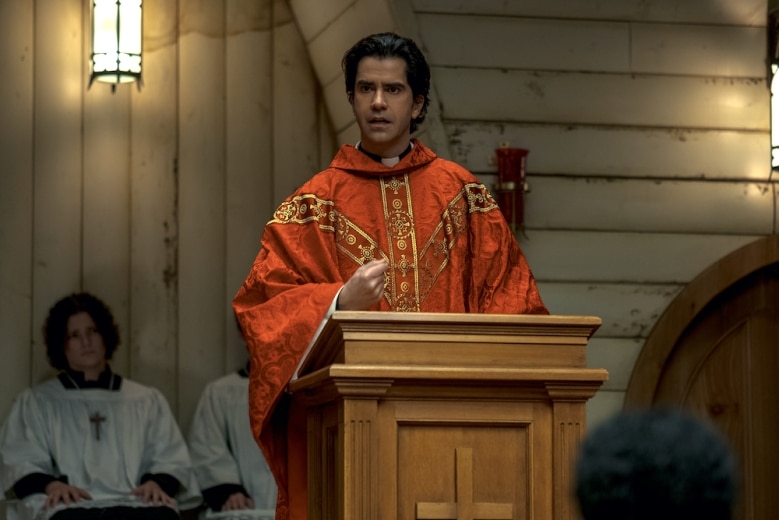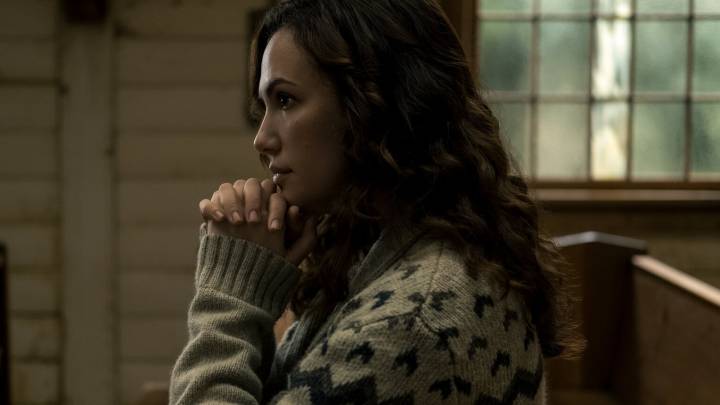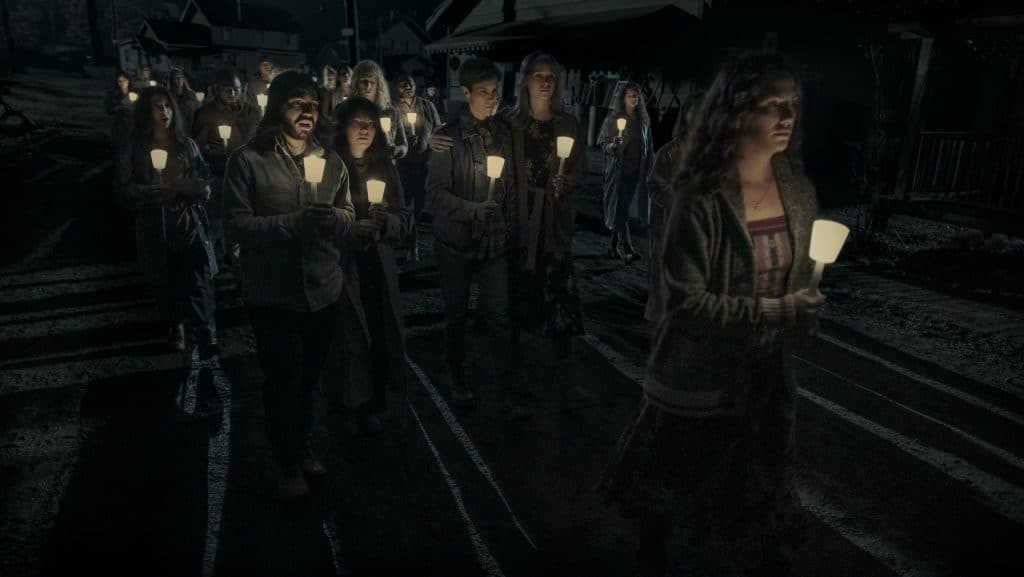Mike Flanagan’s Netflix miniseries may scare some & bore others, but for a few it offers unexpected peace and comfort.
Contains spoilers about Netflix’s Midnight Mass (read our spoiler-free review here)
Let’s just start this off with a bang: I almost died at the end of last year. I make jokes about it and minimize it, because that’s just how I handle things (go ahead, ask my therapists!), but it’s true. I was very sick, so sick I don’t actually remember much of what happened for the first few days after I was admitted into the hospital, so weak and out of it I wasn’t even able to text people to let them know what was going on. It wasn’t COVID, surprisingly, but my kidneys: though I was reasonably healthy up to that point, and there was no family history of it, my kidneys failed, filling my body with toxins. If I had waited a day or two longer to go to the ER, I wouldn’t have made it.
Some would use the word “miracle” to describe how I was able to leave the hospital on my own two feet just ten days later (and return to work within days after that). My miracle was of the scientific kind: they put me on dialysis, and within two sessions I felt much better. Let me clarify, however, that though I feel fine to great most days, my battle isn’t over. My kidneys still don’t work properly. We still don’t know why they failed. I still need dialysis, three days a week, three hours at a time. Most seriously, I’m facing the need for a kidney transplant, which is a whole other thing altogether. But, the important thing is that I made it. To quote a popular meme: I lived, bitch.
As it turns out, almost dying really messes with your head. There’s that obvious gratitude thing. It’s been a long time since suicidal thoughts have crept into the back of my head. But it also makes me think about death a lot, and I was already someone who once seriously considered going to school to get a mortician’s license. I wonder often if I’m living a life worthy of someone who’s been given a second chance. I wonder if God saved me for some kind of purpose that I’m not aware of yet, or if it was simply an accounting error.
In other words, I’m the target audience for Mike Flanagan’s Midnight Mass, a miniseries that so seamlessly blends traditional horror with philosophical conversations on God’s love, redemption and what happens when we die that it’s a bit of a miracle itself.

Thanks predominantly to The Exorcist, Catholic horror is practically its own genre. It’s easy to see why, because so much of Catholicism is steeped in mystery and horror. When Catholics take communion, they are meant to believe they’re actually drinking the blood of Christ. It’s called “transubstantiation,” and it’s a cornerstone of the Catholic faith. Suffering is a virtue, because Jesus Christ suffered — one of the most important parts of Holy Week rituals leading up to Easter is the Passion Play, which recreates Christ’s crucifixion. In the church, the saints are always weeping, and Jesus is always looking heavenward, on the edge of death, wondering why God has forsaken Him.
So yeah, it’s all pretty dark and gruesome. And, for a long time, I loved it.
I did Catholicism backwards. While I had been baptized, my father, who was very decidedly not a churchgoer, claimed it was done “for the party.” I got my religious education from my grandfather, who was such an old school Catholic that he crossed himself whenever he drove past a church, but never made my sacraments. It wasn’t until well into my teenage years, when I got some bee in my bonnet about embracing religion, that I started taking it seriously. I went to church every Sunday, I made my belated sacraments, I went to confession. I made a point of trying to read a Bible verse every day. Not only did I enjoy the pageantry of the church, but I became convinced that if I was a Very Good Person, I’d feel God’s love move within me. I’d get a message that I had passed some sort of test, and that when I died I’d be immediately fastracked to Heaven, do not pass Go, do not collect $200.
Then, after a couple years, I had an epiphany: none of it made sense to me. There was a constant conflict between my desire to take everything I heard at face value, and logic interrupting with “Wait, what?” I never really believed that I was drinking the blood of Christ, even though I was supposed to. I never really felt comfortable with using a priest as a middle man for confession, even though I was supposed to. For a long time, I felt shame and disappointment. I wanted desperately to believe. I wanted it all to make sense.

Part of the horror in Midnight Mass happens because the characters take much of what they read in the Bible literally, without questioning it. Father Paul (Hamish Linklater) mistakes what is clearly a demon that means to do him harm for an angel, because, according to the Gospel of Luke, angels are “terrifying.” The pious monster Bev Keane (Samantha Sloyan) attributes her horrific misdeeds to the Book of Revelation, essentially claiming that it all happens as God meant them to, no matter how much death and destruction it causes. There was a time, I’m now embarrassed to say, when I wanted that mindset. I prayed to be among God’s chosen.
Instead, I abruptly broke away, and it was the last time I tried to find direction in an organized religion. I’ve been tempted by Buddhism and Universal Unitarianism, but never did anything more than the most rudimentary research. I can live without someone telling me when to sit, when to stand, and what they think God’s word means. But I still wanted, badly, to feel some notion of “God,” a presence that offers hope and redemption, a trade-off for the pain we experience in life.
One could say that I was once a perhaps foolishly optimistic agnostic — I didn’t know if God exists, but I sure liked to think He/She does. Of course, the past few years have tested that sort of piecemealed faith, because right now, the way things are, it’s hard to see an existence of any kind of loving God. The world is burning away beneath our feet, and if COVID-19 was a test to see how much we were willing to do to keep our fellow humans safe, then we failed, miserably, far worse than anyone imagined. Atheists might have an easier time processing these things, because they accept that bad things just happen. If you believe in God, you want answers: why is this happening? What did we do? What did I do?

In Midnight Mass, Father Paul’s homilies about hope and rebirth are just what the dwindling members of his parish need to hear, and they drink it up like cold water on a summer day. They don’t know him, but they buy what he’s selling, a brighter day, a chance to make the world something they recognize again. It’s powerful stuff. It’s somehow both horrifying and yet not at all surprising when Father Paul manages to convince his parishioners that the path to redemption is in death, followed by resurrection, like their savior Jesus Christ. That once they’re resurrected they become vampire-like creatures is a minor drawback, a small price to pay in exchange for being able to experience the world as the beautiful creation God meant it to be, when you can hear electricity thrumming in the air, and see new stars being born in the sky. They get to live forever, secure in the knowledge that they are God’s most special children.
Honestly, I can’t blame those who chose to take sacrament in rat poison. Myself, I have no great desire to live forever. It seems, frankly, kind of lonely.
I wish I could tell you what it was like to almost die. I think once I was admitted to the hospital, I felt a strange sort of relief. I didn’t have to do anything but lay there. If I went to sleep and didn’t wake up, I think I would have been alright. But I did wake up, and while I don’t feel special, per se, I do feel different. I feel closer to my friends and family than I did before. I’m more aware of how much of my time is wasted on meaningless nonsense, and I’m trying to go about changing that. After a drearily hot summer, early fall has a crispness in the air that I can feel in every cell of my body, and it fills me with gratitude. I don’t know if God is with me, but there’s something.
Mostly, I’m not afraid of death. Dying, yes, I don’t want to suffer. But not death itself. I came back from it once, I could again, but one day I won’t, and like Erin (Kate Siegel) in Midnight Mass, I am confident that, whether there’s a Heaven or not, the part of me that lights the world will still be out there. My life will seem like a brief, wonderful dream, but the love I gave, and received in turn, will remain, lingering in the air like dust and feathers. Every moment I ever asked “Why?” will be forgotten, because it won’t matter. I am, I was, and I always will be. If you don’t come away from Midnight Mass being oddly at peace with the idea of death, then for that I apologize. But I did, and for that I am grateful.
Midnight Mass is now playing on Netflix.